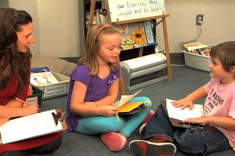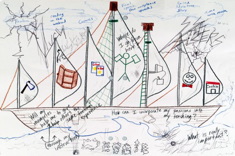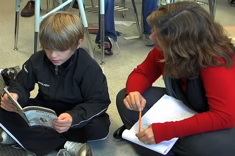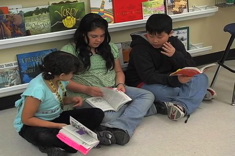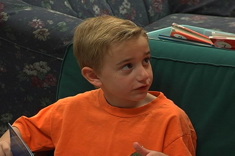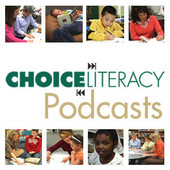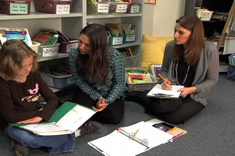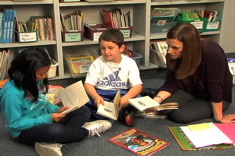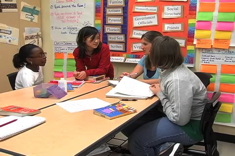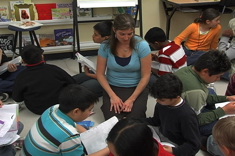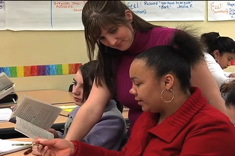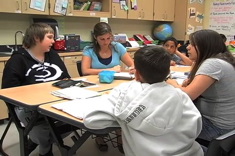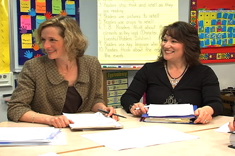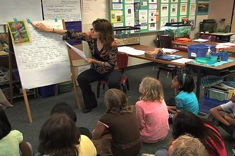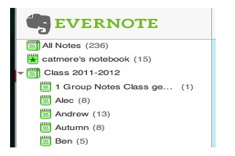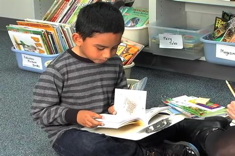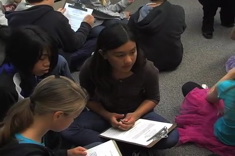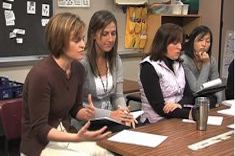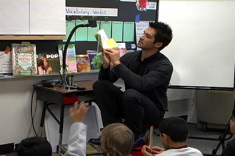Library
Choice Literacy Articles & Videos
The Choice Literacy library contains over 3,000 articles and 900 videos from 150+ contributors. Classic Classroom and Literacy Leadership subscribers have access to the entire library. Content is updated continuously, with five to six new features published each week.
Latest Content
Exit Slips Open Doors
Amanda Adrian explains how a simple professional development closure activity garnered many new invitations to classrooms.
Literacy Groundings
Andie works with new teachers as they share their literacy groundings — the moments in their histories that shaped who they are as educators.
Stop and Track: Conferring with a Fifth-Grade Reader
In this conference with a 5th grader, Aimee Buckner shares two strategies — one to use when putting a book away between readings, and another to help keep track of characters in a complex narrative where the point of view is constantly shifting.
Fresh Books and Age-old Skills
Suzy Kaback provides a booklist of newer texts that can be used to teach multiple reading strategies.
Middle School Book Clubs: Introduction
Katie Doherty explains why she has book clubs with her 6th grade students.
Fluency in Focus: Conferring with Jake
Gail Boushey confers with Jake, a seven-year-old who is setting a reading goal of developing fluency. After the conference, she debriefs with Joan Moser.
Literacy Coaching and Student Work with Diane Sweeney (PODCAST)
Diane Sweeney talks about the importance of focusing more on student work and less on teacher plans and lessons for literacy coaches.
Listen In: Knowing When You’re Done
When is writing finished? Heather Rader confers with a second grader over that age-old question for writers as Linda Karamatic listens in.
Guiding Reading Partners: Work on Accuracy
In this reading conference from a 2nd grade classroom, Linda Karamatic pairs two children who have similar needs in reading.
Middle School Book Clubs: Response Options
Students have different response options in Katie Doherty’s sixth grade book clubs.
Every. Single. Day.
Ruth Shagoury listens in as Katie Doherty's students give advice to a new classmate, and in the process reveal the norms and expectations for reading and writing workshops.
“And Then and Then and Then”: Moving Students from Retelling to Thoughtful Response
Katie Doherty confers with sixth grader Kristina during reading workshop. Kristina is new to the classroom, and Katie demonstrates how to gently move a student from retelling to more thoughtful responses to literature with a few simple and carefully worded questions.
Middle School Book Clubs in Action
Katie Doherty talks about the links between strategy lessons and book club work in her 6th grade classroom. Katie also sits in on a book club discussion.
Telling Our Stories
Ruth Shagoury and Andie Cunningham beautifully weave together poetry and storytelling in a potent professional development activity for teachers.
The Power of Powerpoints for English Language Learners
Erin Ocon discovers a surprising tool to help her middle school English language learners develop their writing and oral language skills — Powerpoint presentations. Erin shares some practical tips for using presentation software to support English language learners.
Vocabulary, Comprehension, and the Common Core: A Conversation with Doug Fisher (PODCAST)
In this podcast, Doug Fisher discusses how vocabulary fits into the Common Core State Standards.
Listen In: XBox Game Writing
Boys and their toys: Heather Rader confers with a second grader over his game writing while Linda Karamatic listens in.
Frogs as Learning Ambassadors Part 1: Literary Nonfiction in 4th Grade
Andrea Smith gets creative in teaching literary nonfiction to her 4th graders in this video series.
Making Assumptions
The shift from teaching children to mentoring adults can be difficult for many educators. Ellie Gilbert chronicles the biggest assumptions that harm collaborative relationships with colleagues.
Capturing Student Learning with Evernote
It can be difficult to move from print to electronic records in the classroom. After using a spiral notebook for 10 years, Cathy Mere did just that.
Narrative Nonfiction in 5th Grade Part 2
In this lesson from a 5th grade classroom, Aimee Buckner guides students in a note-taking process to help understand the qualities of nonfiction narrative writing. In this second part of the lesson, students share their notes and Aimee makes connections to additional mentor texts.
Words and Images: Mentor Texts for Second Grade Boys
In this conference with two of her second-grade students, Linda Karamatic shares mentor texts and tips to help them with their writing. Both boys are writing stories with strong visual components.
The Sponge Summary Lesson Part 5
In this sequence of videos, Heather teaches a 4th grade class, using the analogy of a sponge to explain how summaries work. In this fifth video, Heather and students shift from “I do” to “we do” as students try test their summary writing skills with partners
Professional Development Openers and Icebreakers (ROUND-UP)
This round-up includes suggestions for opening activities and icebreakers to energize your colleagues from Amanda Adrian, Aimee Buckner, Shari Frost, and Jennifer Jones.
You’ve Got to Be Joking
A first-year teacher struggles to manage a class with boys who are cut-ups. From the lemons to lemonade department, Heather Rader helps him build on student strengths by developing a popular writing unit on joke writing.
Literacy Team Meeting: Focus on Word Work Part 2
In the second part of the literacy team meeting, teachers on the team move from the focus on sharing, to the important phase of where to go next as a team and as a school. Because the crucial work of the team is the work done between meetings, this is a critical discussion.
Book Matchmaker: “Cool” Books for a Struggling Second Grader
Franki Sibberson selects some “cool” books for a struggling reader who wants to fit in with his 2nd grade peers.
Book Matchmaker: Global Citizenship and Social Responsibility
Here are some newer books for teaching students about social responsibility and what it means to be a citizen of the world.
Nonfiction Read Aloud
Sean Moore reads nonfiction aloud to his 2nd grade students. This is the first video in a two-part series.
Tried and True Trumps Shiny and New
Amanda Adrian explains why running records are still an essential tool in any teacher’s assessment arsenal. She also includes links to web resources for honing your running record skills if they are a bit rusty.
Browse Content By
Type
Category
- Assessment Tools
- Big Fresh Archives
- Booklists
- Choice Numeracy
- Classroom Design
- Common Core
- Community Building
- Conferring
- Content Literacy
- Digital Literacy
- English Language Learners
- Equity
- Family Relations
- Free Samples
- Guiding Groups
- Leadership
- Literacy Coaches
- Mentor Texts
- Minilessons
- New Teacher Mentors
- Podcasts
- Poetry
- Quote Collections
- Reading Strategies
- Self Care
- Struggling and Striving Learners
- Talking and Listening
- Teacher Study Groups
- Teaching Reading
- Teaching Writing
- Word Study and Vocabulary
Author
- Melissa Quimby
- Nawal Qarooni
- Gwen Blumberg
- Julie Cox
- The Lead Learners
- Ruth Metcalfe
- Mallory Messenger
- Becca Burk
- Jodie Bailey
- Vivian Chen
- Mary Brower
- Stephanie Affinito
- Ruth Ayres
- Leigh Anne Eck
- Heather Fisher
- Shari Frost
- Julie Johnson
- Suzy Kaback
- Clare Landrigan
- Gigi McAllister
- Shirl McPhillips
- Melanie Meehan
- Cathy Mere
- Debbie Miller
- Tara Barnett and Kate Mills
- Tammy Mulligan
- Dana Murphy
- Bitsy Parks
- David Pittman
- Brenda Power
- Heather Rader
- Matt Renwick
- Mandy Robek
- Christy Rush-Levine
- Gretchen Schroeder
- Jen Schwanke
- Brian Sepe
- Katherine Sokolowski
- Stella Villalba
- Jennifer Vincent
Grade Level
Choice Literacy Membership
Articles
Get full access to all Choice Literacy article content
Videos
Get full access to all Choice Literacy video content
Courses
Access Choice Literacy course curriculum and training

